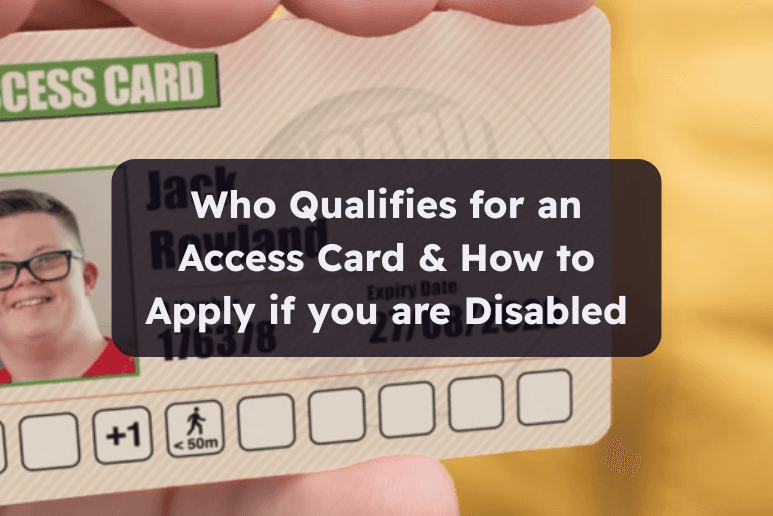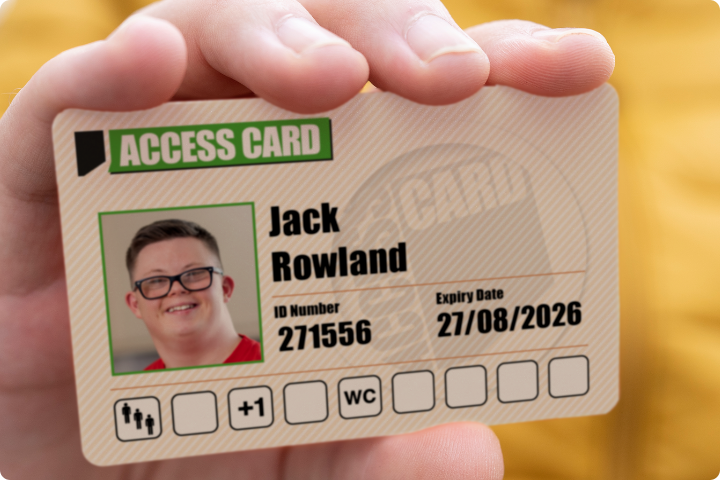All Articles
9 min read
Access Card: Who Qualifies and How to Apply
Written by
Georgina, Founder of Purpl
Published on
November 20, 2024

Purpl partners with Nimbus Disability’s Access Card scheme, which is a type of card for disabled people in the UK. It works as a photo ID for disability access. It shows an individual’s access requirements using recognised symbols, so venues can quickly understand what support may be needed.
This Purpl guide explains who qualifies for an Access Card and how to apply for one.
Purpl members can get 10% off.
At a Glance
- Access Card is a photo ID that communicates access requirements using recognised symbols
- Widely recognised across the UK; acceptance varies, so checking the official provider directory is recommended
- Access Card is commonly priced at £15 for 3 years; a 10% off Purpl discount code is available
- The card can reduce repeated explanations, but does not guarantee a specific adjustment (for example, a free companion ticket)
In this Guide
- What is the Point of an Access Card?
- Where is the Access Card Accepted?
- Who is Eligible for an Access Card in the UK?
- How Much Does it Cost?
- How to Apply
- Receiving Your Card
- Is it Worth Having One?
- Before You Apply
- How to Renew Your Card
- Frequently Asked Questions (FAQs)
What is the Point of an Access Card?
The Access Card can work online with platforms like ticketing systems to help unlock the access facilities that are needed. This helps organisations support visitors who need extra assistance or have specific accessibility requirements. It can make a venue or service more inclusive and welcoming.
It works as a photo ID and uses clear symbols to show a person’s access requirements. These symbols can help communicate barriers a person faces and the reasonable adjustments that may help, which can support smoother entry and improved accessibility at venues.
Communicating Your Access Needs
Having a way to communicate access needs in a simple, visible format can make it easier for venues to prepare and provide the right support. It can also help disabled people choose services and locations that meet their needs, reducing uncertainty.
The card can streamline how access needs are shared by translating evidence-based access requirements into easy-to-understand symbols. For many people, this can reduce repeated conversations and repeated requests to share sensitive paperwork. Official guidance on how the scheme works is available via the Access Card website: How it works.
The card can be applied for even if disability benefits are not being claimed. Keep reading to see what evidence can be used.
Where is the Access Card Accepted?
The Access Card team works to grow the number of venues that recognise it as a way to verify and communicate access requirements. However, acceptance and policies vary by provider, so it is always best to check the specific venue’s access information before booking or visiting.
Browse the official provider directory here: Find a provider (or use the searchable list: Search providers). Nimbus Disability and the Access Card scheme also publish updates here: Access Card News.
In some cases, a provider may offer a concession or an essential companion ticket (often linked to a +1 symbol). In other cases, venues use the card mainly to understand access requirements and put support in plac
The scheme’s terms make clear that the card does not guarantee access or any particular service, and providers decide what they can offer:
Access Card terms & conditions.
The Access Card team marks some provider listings as “Named and Famed”, using feedback and publicly available provider information. This does not guarantee any fixed service or policy, but it can help as a starting point when planning. (Example listing format: Tower of London (Named and Famed).)
Venues do not need the Access Card to have responsibilities under equality legislation. Service providers must make reasonable adjustments for disabled people, and they cannot charge disabled customers for those adjustments. Read the official guidance here: Disability: quick start guide for service providers (GOV.UK). The card can help communicate needs, but venues should base support on a person’s requirements and their own policies, not only on whether someone holds a card.

Who is Eligible for an Access Card in the UK?
So, who qualifies? There is no fixed list of eligible disabilities. Instead, the card’s scheme focuses on an individual’s specific access needs, supported by evidence. During the application process, documents are provided to back up disability access requirements. The team can then assess needs and allocate the most appropriate access symbols.
Supporting Evidence
- Confirmation of benefits such as Disability Living Allowance (DLA), Personal Independence Payment (PIP), or Attendance Allowance.
- The evidence must be recent and clearly show name and address.
- It must also display the awarded rates for the Mobility and Personal Care/Daily Living components.
- Please note, the Access Card team cannot take into account Covid Extension letters, ESA, UC, Blue Badges, appointment letters, or Christmas Bonus letters as evidence. (Official evidence guidance: Access Card evidence guidance)
- A letter from a medical professional who is aware of needs.
- This letter must be recent, written on official surgery or organisational headed paper, and clearly state diagnosis and the impact of the condition(s), as described in the application.
- For conditions with variable impact, confirmation of diagnosis alone may not be enough to process an application.
- Other supporting documents such as occupational health reports, care plans, or OT assessments. These can help confirm specific accessibility needs for events and venues.
If it is unclear what evidence to provide, it can still be worth submitting an application. The Access Card team may be able to discuss circumstances directly and advise on next steps.
Submitting clear evidence helps the team verify needs more quickly and helps ensure the card reflects actual access requirements.
How Much Does it Cost?
There are two different options for getting support through the Access Card system: a free, venue-specific registration (Digital Access Pass), and the paid Access Card.
How to get a Free Single Use Access Card (Digital Access Pass)
If you only need disability access for one venue, you can often apply through that venue’s free access registration scheme (often called a Digital Access Pass or DAP) instead of completing a full Access Card application.
After Nimbus approves the registration, the team emails an ID number. That number usually only works for the venue it relates to, and the free option does not include a physical card. (Official explanation: What is a Digital Access Pass (DAP)?)
The Access Card system lists venues and providers that currently run free access registration schemes, including:
- Merlin Entertainments Ride Access Pass
- The Ticket Factory
- The Ticket Quarter
- Paultons Park – Home of Peppa Pig
- Ambassador Theatre Group
- Delfont Mackintosh Theatre Group
- Winter Gardens Blackpool
- Birmingham Hippodrome
- KX Tickets
- BARC (British Automobile Racing Club)
- VECTIS (Blackgang / Robin Hill)
- Drayton Manor
- Blackpool Pleasure Beach
- Glastonbury
- Knowsley Safari Park
- Raiders
- Fishers Farm Park
- Musicalcon
- Norwich Theatre
- Crealy Theme Park
- Pleasurewood Hills
- PREMIER
- Raver-Tots
- Piws
- West Midland Safari Park
- The Principality Stadium
There are a further 2,000+ venues listed in the Access Card provider directory. Browse the official directory here: https://www.accesscard.online/find-a-provider/search/
Paid Access Card
The paid Access Card typically costs £15 and lasts for three years. Thousands of providers appear in the official directory, and many venues use the card to understand access requirements across services. (See official pricing and overview on the Access Card website.)
Purpl members can use a Purpl discount code to claim 10% off: Access Card discount code.
How to Apply
The Access Card scheme is run by Nimbus Disability, a social enterprise founded and led by disabled people. It is designed to help people communicate access requirements more clearly and consistently. (Official scheme pages: Apply or renew)
Step 1: Upload Medical Evidence
First, provide evidence of illness or disability, such as medical reports, doctor’s letters, or proof of disability benefits. Next, upload proof of identity, such as a driving licence or passport, along with a clear, passport-style photo.
By doing this, needs and identity can be verified, and the Access Card can reflect specific requirements. Nimbus also explains that evidence-based verification helps protect accessible features from misuse.
Step 2: Provide Information for Each Access Symbol
After that, provide information for each symbol that is required. The Access Card displays a set of symbols that communicate accessibility requirements to event and venue staff. Each symbol represents a specific type of support or adjustment.
During the application, describe needs and provide evidence for each symbol that is requested. For full details on symbol allocation and how each is assessed, refer to the official guidance: Access Card FAQs and guidance.
Symbol Information
- Standing and Queuing – indicates if alternatives to standing for long periods or queuing are needed.
- Level Access – shows that step-free entry or level pathways are required.
- Distances – highlights a need for closer parking or reduced walking distances.
- The WC Symbol – confirms a need for accessible toilet facilities.
- +1 Essential Companions – used by some providers to evidence the need for an essential companion ticket (policies vary; always check the provider listing and access policy).
- Child Essential Companion Tickets – explains the allocation of the +1 symbol for children.
- Accessing Visual Information – indicates support needed for visual information, such as large print or tactile materials.
- Accessing Audible Information – highlights support for hearing, such as hearing loops or captioning.
- Anything Else – allows other impacts of an impairment to be noted, flagging extra support that might not otherwise be shown on the card.
With the Access Card, it can feel easier to attend venues with more confidence, knowing staff can quickly understand what support may help.
Receiving Your Card
In the confirmation email, it is possible to upgrade postage to 1st Class Signed For delivery or Next Day Special Delivery. Nimbus prints cards daily and works to Royal Mail collection time slots. (Official delivery guidance: Faster delivery (Nimbus help))
Nimbus typically only fulfils upgraded postage for requests made before 11:00am, Monday to Friday. If someone requests an upgrade after 11:00am, Nimbus usually processes it in the next working day’s postage slot. (Official delivery cut-off guidance: My Access Card has not arrived yet)
The Access Card terms also explain standard delivery times and non-delivery rules, including card posting timeframes and when a reprint fee may apply: Access Card terms & conditions.

Is it Worth Having One?
The Access Card makes life easier for many disabled people in the UK. It can reduce the need to repeatedly explain a disability or access requirements, which can be especially challenging for people with hidden disabilities.
We asked Purpl members whether they had an Access Card, and to provide feedback. Here are some responses:
“I’ve had one for a while I think it’s worth it we go to the theatre quite often, it’s paid for itself after the first visit.”
“I feel I would need one to watch shows as they don’t accept other disability cards at a lot of theatres or venues for sporting events.”
“You can even use the Access Card in Primark if you have issues queueing.”
“I’ve only got mine about 6 weeks ago, but I’ve used it to get free plus one tickets at 3 events so far. I know I’ll definitely be using it quite often in the future.”
“The Access Card is absolutely invaluable to me as PIP is impossible and soul destroying to get, infuriatingly.”
Quick Checklist – Before You Apply
- Read all guidance notes: avoid mistakes that can delay an application or result in a £5 reprint fee in some situations (see terms for reprints and replacements).
- Give detailed answers: provide enough information to help the Access Card team determine which access symbols apply.
- Upload clear evidence: follow official guidance on what documents can and cannot be accepted.
- Pay at the end of the form: if applying for the paid Access Card, payment happens at the end of the process.
- Refunds: if Nimbus is unable to provide a card because of ineligibility, their terms state a full refund is provided within 14 days.
- Submit all requested documents: missing information will delay an application.
Useful official links: Evidence guidance | Terms & refunds | Apply or renew
How to Renew Your Card
Nimbus sends renewal reminders by email up to three months before the Access Card expiry date and includes a link to renew online. (Official renewal guidance: Renewing your Card)
When ready, start the official renewals process here: Renew your Access Card or Digital Access Pass. The renewal flow asks whether access requirements have changed, and the guidance explains how people can handle updates.
If the system cannot process a renewal automatically, Nimbus asks cardholders to contact the team by email or phone (see contact details on the renewals page): Renewals page (contact details).
If someone’s needs change outside renewal, they can request a reassessment at any time by emailing the Access Card team and putting their current card number in the subject line. A £5 admin fee may apply for a reissued card. (Official change guidance: What if my needs change?)
Frequent Asked Questions (FAQs)
Who qualifies for an Access Card?
The Access Card scheme bases eligibility on an individual’s needs, not only on having a disability.
Is there a free Access Card?
Yes, the scheme offers a free option (a venue-specific Digital Access Pass), but it does not include a physical card and usually only applies to the venue it relates to. The guide above and the official provider directory list venues that offer free registration schemes.
Why is it hard to get an Access Card?
The scheme uses a fair, structured process for people who need access support and can provide evidence. The team keeps the process thorough so providers can protect accessible resources and concessions for people who genuinely need them.
What if needs change?
If needs change, someone can request a reassessment at any time by emailing the Access Card team, putting their current card number in the subject line, and explaining what needs to change. Include any further evidence if new symbols are being requested. A £5 admin fee may apply for a new card.
About the Author

Georgina is the founder of Purpl, a platform dedicated to helping disabled people save money through exclusive discounts. Living with both Multiple Sclerosis (MS) and ADHD, she understands firsthand the financial challenges that often come with managing a disability. Because of this, her mission is to collaborate with brands to secure discounts that help ease the cost of essential products, services, and everyday expenses for the disabled community.
As an ambulatory wheelchair user, Georgina also knows how it feels to lose a sense of independence due to a disability. For that reason, she’s deeply passionate about using holistic therapies and diet to manage inflammation and stay as healthy as possible. Ultimately, her goal is to make Purpl a trusted, go-to resource for disabled people — one that provides not only discounts but also practical advice, emotional support, and genuine financial relief.
Beyond Purpl, Georgina has a long-term vision to launch a foundation that will offer grants and funding for disabled people who need additional financial support. Through this, she hopes to create lasting change, empowering others to live with dignity, confidence, and choice.
Follow @Purpldiscounts on social media for the latest disability discounts, financial advice, and accessibility resources.
Other articles, or links, you might find useful:
How to Apply for a Disabled ID (DID) Guide
The CEA Card: Benefits For Disabled People & Free Cinema Tickets
How to Apply for Disabled Person’s Railcard
Get 10% off an Access Card
Discount Card for Disabled People: How Purpl’s New Digital Membership Card Works
Hidden Disability Cards: A Small Card That Makes a Big Difference
PIP Freebies and Discounts 2026: Maximise Savings with your PIP Benefits
